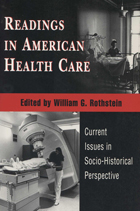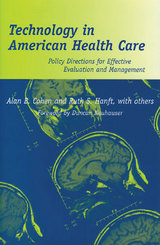2 books about American Health Care

Readings In American Health Care
Current Issues In Socio-Historical Perspective
William G. Rothstein
University of Wisconsin Press, 1995
Readings in American Health Care is an introduction to the historical development and current status of a wide variety of health care topics. The readings, written by historians, sociologists, economists, physicians, nurses, and public health researchers, are organized in sections:
• Basic Concepts: mortality trends, concepts of disease, changes in medical therapy
• Public Health: AIDS, cigarette smoking, preventive medicine, fluoridation
• Health Care Professions: cardiology, pathology, women in medicine, nursing, podiatry, midwives
• Health Care Organizations: hospitals, HMOs
• Mental Illness
• Financing Health Care
• Medical Education
• Issues: abortion, ethical issues, cancer control, prenatal care, home care, the pharmaceutical industry
• Background Readings: American medicine from 1920 to midcentury.
The readings were chosen especially for course use in history, sociology, public health, and related fields, but can also provide useful background reading for anyone interested or involved in American health care. Each selection includes an introduction, questions for the reader, and a bibliography. Scholars and students alike will find the book an invaluable resource.
• Basic Concepts: mortality trends, concepts of disease, changes in medical therapy
• Public Health: AIDS, cigarette smoking, preventive medicine, fluoridation
• Health Care Professions: cardiology, pathology, women in medicine, nursing, podiatry, midwives
• Health Care Organizations: hospitals, HMOs
• Mental Illness
• Financing Health Care
• Medical Education
• Issues: abortion, ethical issues, cancer control, prenatal care, home care, the pharmaceutical industry
• Background Readings: American medicine from 1920 to midcentury.
The readings were chosen especially for course use in history, sociology, public health, and related fields, but can also provide useful background reading for anyone interested or involved in American health care. Each selection includes an introduction, questions for the reader, and a bibliography. Scholars and students alike will find the book an invaluable resource.
[more]

Technology in American Health Care
Policy Directions for Effective Evaluation and Management
Alan B. Cohen and Ruth S. Hanft, with William E. Encinosa, Stephanie M. Spernak, Shirley A. Stewart, and Catherine C. White
University of Michigan Press, 2004
"The definitive overview of health technology assessment in the U.S. and Europe, the biotech industry, adoption and use of medtech in health care."
---The World Future Society, Best Books and Reports
---The World Future Society, Best Books and Reports
"This excellent book provides a broad overview of the development, impact, and evaluation of health technology in the United States. . . .The authors take a well-organized and thorough approach to address these topics, combining reviews of each with case examples of particular technologies. . . .Given the broad scope of the book, it could serve as a text for students, an introduction to the field for healthcare professionals, or a tool for academics and policymakers wishing to fill knowledge gaps outside their disciplines. . . .The book makes a compelling case for the logic and potential benefits of medical technology evaluation as a tool for improving health care."
---Journal of the American Medical Association
"By being comprehensive in their review, the authors chart a clear path to understanding the future of health care technology in America. They clarify the technical methods for evaluation and provide insight into the sociopolitical aspects of development and diffusion. Case studies are informative. Excellent reading for students and health professionals either as a textbook or as an off-the-shelf guide to methods for deciding among alternative technologies."
---Norman W. Weissman, University of Alabama
"Technology today dominates every aspect of health care. This useful book offers a diverse range of perspectives for students, professors, and medical practitioners who wish to understand how to evaluate medical technology."
---Joel Howell, University of Michigan Medical School
Technology in American Health Care is a comprehensive, multidisciplinary guide to understanding how medical advances-new drugs, biological devices, and surgical procedures-are developed, brought to market, evaluated, and adopted into health care.
Cost-effective delivery of evidence-based health care is the sine qua non of American medicine in the twenty-first century. Health care decision makers, providers, payers, policymakers, and consumers all need vital information about the risks, benefits, and costs of new technologies in order to make informed decisions about which ones to adopt and how to use them. Alan B. Cohen and Ruth S. Hanft explore the evolving field of medical technology evaluation (MTE), as well as the current controversies surrounding the evaluation and diffusion of medical technologies, including the methods employed in their assessment and the policies that govern their adoption and use.
The book opens with an introduction that provides basic definitions and the history of technological change in American medicine, and a second chapter that explores critical questions regarding medical technology in health care. Part I discusses biomedical innovation, the development and diffusion of medical technology, and the adoption and use of technology by hospitals, physicians, and other health care organizations and professions under changing health care market conditions. Part II examines the methods of MTE-including randomized controlled trials, meta-analyses, economic evaluation methods (such as cost-benefit, cost-effectiveness, and cost-utility analyses), and clinical decision analysis. Part III focuses on key public policy issues and concerns that affect the organization, financing, and delivery of health care and that relate importantly to medical technology, including safety, efficacy, quality, cost, access, equity, social, ethical, legal, and evaluation concerns. All three parts of the book provide a historical perspective on the relevant issues, methods, and policy concerns and contain examples of technologies whose development, adoption, evaluation, and use have contributed to our understanding of the field.
This book will be invaluable in making MTE more accessible to individuals who are directly involved in the evaluation process and those who are touched by it in their professional lives-policymakers, clinicians, managers, and researchers.
[more]
READERS
Browse our collection.
PUBLISHERS
See BiblioVault's publisher services.
STUDENT SERVICES
Files for college accessibility offices.
UChicago Accessibility Resources
home | accessibility | search | about | contact us
BiblioVault ® 2001 - 2024
The University of Chicago Press









